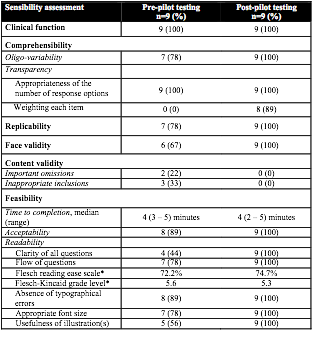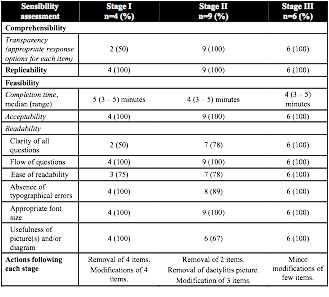Session Information
Session Type: Abstract Submissions (ACR)
Background/Purpose: Inflammatory bowel disease (IBD) encompasses Crohn’s disease, ulcerative colitis, and indeterminate colitis. Articular involvement [(peripheral arthritis and axial spondyloarthritis (axSpA)] is the most common extra-intestinal manifestation. There is an unacceptable delay in diagnosis of axSpA by 8-11 years. Our aim was to develop a sensible and reliable questionnaire that identifies undetected axSpA among IBD patients and facilitates timely referral to rheumatologists.
Methods: Literature review facilitated identification of 3 domains:1) IBD, 2) inflammatory back symptoms, and 3) extra-axial features. Items of the Toronto Axial Spondyloarthritis Questionnaire (TASQ) were evaluated for sensibility among SpA team, 2 general rheumatologists, and axSpA patients. Sensibility assessment was related to purpose and framework (clinical function, clinical justification, clinical applicability), face validity, comprehensibility (oligovariability, transparency), replicability, content validity, and feasibility. For the test-retest reliability study, the final version of TASQ was mailed to 77 patients with established IBD and axSpA, who were followed at the Spondylitis clinic. Patients were instructed to complete the questionnaire on 2 occasions 1-2 weeks apart. Calculated sample size was 23 for reliability. Kappa statistics were calculated for the binary response options of each item.
Results : Item modification and reduction led to drafting version 4 of TASQ consisting of 16 items on a one-page double-sided document with a diagram of the back. Of the 77 patients, 34 responded to the TASQ. Responders and non-responders did not differ in terms of age, sex, level of education, types of IBD, BASDAI, BASFI, ESR and CRP levels. Kappa agreement coefficient ranged from 0.81 to 1.00 indicating almost perfect agreement. Absolute agreement of all items ranged from 91 to 100%.
Table 1
Table 2
Conclusion : TASQ is a newly developed, sensible and reliable questionnaire to be administered to patients with IBD who have ever had chronic back pain or stiffness that lasted ³ 3 months. TASQ should facilitate identification and referral of IBD patients to rheumatologists and should avoid delay in diagnosis of axSpA.
Disclosure:
K. A. Alnaqbi,
None;
Z. Touma,
None;
L. A. Passalent,
None;
S. R. Johnson,
None;
G. A. Tomlinson,
None;
A. Carty,
None;
R. D. Inman,
None.
« Back to 2012 ACR/ARHP Annual Meeting
ACR Meeting Abstracts - https://acrabstracts.org/abstract/development-sensibility-and-reliability-of-a-new-case-finding-questionnaire-the-toronto-axial-spondyloarthritis-questionnaire-in-inflammatory-bowel-disease/


